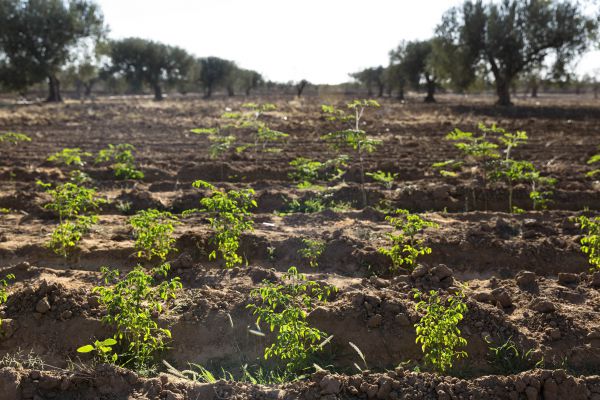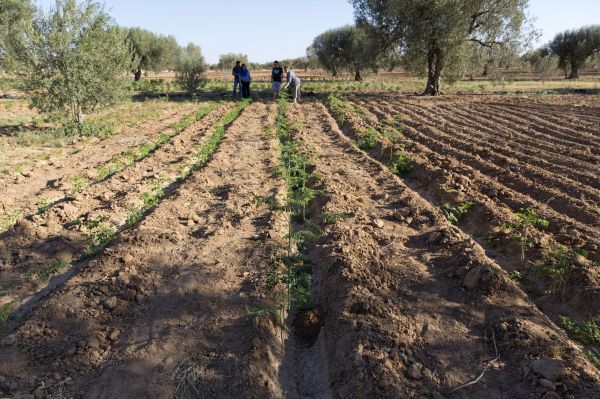Although Sarah Toumi has earned plaudits for exploring the potential of growing moringa in Tunisia
I went to Tunisia to write a positive story about a young French-Tunisian woman who is revolutionising agriculture in the Maghreb. Instead, I found a mirage where her moringa fields should be — and a perfect metaphor for much that is wrong with the relationship between France and its former African colonies.
According to a number of glowing reports, the moringa fields of 29-year-old Sarah Toumi are the future of farming in what is a dry, arid region. Moringa, known as “the magical tree” for its ability to grow in harsh conditions, is one of several supercrops that have the potential to alleviate hunger in the developing world.
Toumi made her name as a vocal advocate for the benefits of moringa. Her moringa fields are, supposedly, the test case to show that the crop can work in Tunisia, and have earned her plaudits from all over the world.
She is on Forbes’ list of “30 under-30” social entrepreneurs. She won last year’s Rolex Prize for Enterprise, receiving the award at a lavish ceremony at Hollywood’s famous Dolby Theatre. The narrative on the Rolex website is one of a girl who “dreamed of changing the world” and, today, is “working towards it, by driving back the Sahara Desert with a sustainable army of hardy trees. She plans to plant a million trees by 2018.”
She is, in her own words, a superhero.
In recognition of her work, Toumi was selected as one of 11 members of France’s new Presidential Council for Africa. This is a new initiative from French President Emmanuel Macron, designed to improve French policy on Africa. Macron promised that council members would have “direct access” to him and would help him to “find channels of discussion with this African reality that has been somewhat lost in recent years”. They would also meet with Macron ahead of every trip he makes to Africa, helping him to draft speeches.
This would, presumably, help Macron to avoid repeating the kind of gaffe he made early in his presidency, when he said that “civilisational” problems were holding Africa back.
But Toumi’s appointment to the new Presidential Council for Africa and the way she was appointed reveal the extent to which French policy on Africa is disconnected from reality.
I visited Bir Salah, Toumi’s village and the site of the famous moringa revolution. I saw a beautiful garden of moringa trees, where Toumi’s aunt is cultivating the crop. There are journalists and film crews here almost every week, encouraged by editors looking for a good news story from Africa: something other than the tired tropes of “bad terrorist”, “desperate migrant” or “starving child” that still drive so much media coverage of the continent. Some of these journalists are on trips paid for by nongovernmental organisations or companies like Rolex, which want their brands to reflect the glow of Toumi’s supposed successes.
But outside of this one garden, there is scant evidence of any other moringa plantations, or the good-news story I had come to find. I know because I spent a month in the country looking.

[Sarah Toumi’s efforts don’t extend much beyond one garden in Bir Salah. (Reto Albertalli)]

There was no evidence of the moringa farming co-operatives that were supposed to improve the lives of 10-million farmers, according to another glowing profile of Toumi, this time from Ashoka, a social entrepreneurship NGO. There was close to no evidence of any farmers, other than Toumi’s aunt, trying to make moringa commercially viable. There was no evidence that Toumi’s much-lauded project extended much beyond her aunt’s garden — despite the positive headlines, the awards and all the funding she has received.
Given this context, how and why was Toumi included among the 11 Africans chosen to advise the French president?
Shortly before announcing his new council, Macron sent an email to his Africa-based ambassadors asking for nominations. In Tunis, ambassador Olivier Poivre d’Arvor — a big name in French broadcasting — suggested Toumi.
I phoned the ambassador and asked him to explain the rationale for his choice. He was on a scooter on his way to the Élysée, the official residence of the French president.
“Her personal journey … It is rare for kids of the diaspora to come back and live in difficult conditions, in a remote village,” he said.
I interrupted him — Toumi lives in a chic neighbourhood in Tunis, nowhere near her village. Flustered, the ambassador continued: “I mean, where she works, where her farm is, where her parents live …”
Toumi doesn’t own a farm. Neither do her parents. Her mother lives in France and her father is dead. The ambassador, it was clear, knew very little about the woman he was proposing for the council. Like everyone else, he had bought into the “Afro-optimist”, “feel good” narrative that made Toumi’s story so sexy — without doing the necessary due diligence to make sure it was true.
This, in its own way, is just as patronising as negative stereotypes about Africa.
While writing about this story for French publications, I have been repeatedly advised “not to be too harsh on that one”, pushed “to understand that lying is a relative concept in different cultures, maybe she takes medicine and has problems with reality”, told that “she is very fragile and could even commit suicide”. Most interviewees asked me to withdraw their testimonies afterwards so as not to “damage the image of a woman trying to do something”.
But this all misses the point.
Maybe Toumi — whose failure is not just hers, but also the result of entrenched sexism and structural obstacles — is the victim of a system that manufactures heroes. Maybe truth really is relative and the truth promoted by corporate social responsibility departments and award committees prizes narrative over facts because everyone wants to believe a good-news story.
But — perhaps naively — I was hoping for more from politicians. If Macron wants fact-based advice on Africa, then in Toumi he has appointed the wrong person to his new council.
Her moringa fields are little more than a mirage in the Tunisian desert. Now that mirage is informing policy in the Élysée.